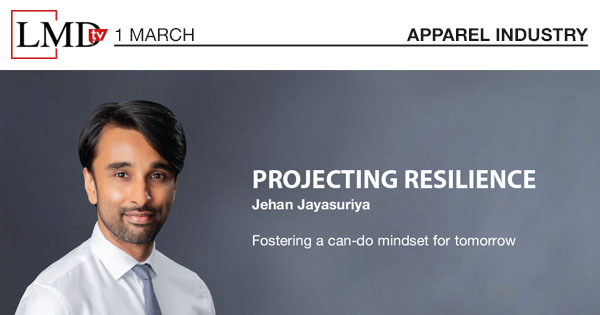The largest contributor to Sri Lanka’s export basket – the apparel industry – has remained resilient despite the challenges that have come its way due to the economic crisis. MAS Intimates’ Chief Marketing Officer Jehan Jayasuriya believes that there needs to be optimism for the future, built on Sri Lanka’s experience in navigating challenging circumstances in its young history as a nation.
In a recent LMDtv interview, he discussed the need to move forward with a mindset of resilience as the country is “heading towards volatility and uncertainty.”
This volatility is the result of multiple headwinds and tailwinds due to geopolitical tensions, as well as dynamics in key export markets such as the US and EU.
“Over the last three or four decades, Sri Lanka has built a very strong image among certain segments of these Western markets and certain brands as a manufacturer and location,” he said, mentioning that it is based on this strength and unique selling point that the country should continue to build the apparel industry.
He noted: “I wouldn’t say Sri Lanka is a cost leader – although we are very cost competitive. What brings best in class brands to this country to source apparel is the strong belief [built] over many years that it is a sustainable location from social, talent and environmental perspectives.”
Jayasuriya also highlighted another point of strength for the local apparel industry – strong long-standing partnerships. “The biggest brands – which source in scale from Sri Lanka and have done so for many years – are committed to the island and know the value that we can bring,” he explained, adding: “These key value propositions have helped the industry over the years and make us resilient now as we move forward.”
Fashion continues to evolve, and he emphasised that the apparel industry needs to keep pace through innovation in product design and business models. “It’s very important to maintain a mindset to keep changing and evolving before the world asks us,” he asserted.
Sri Lanka’s apparel industry has set an ambitious target of achieving annual exports amounting to US$ 8 billion by 2025. Jayasuriya shared his views on how this goal can be accomplished: “The single rule would be to build confidence in ‘Brand Sri Lanka’ as a strong, financially resilient nation that has taken a beating over the last 12-24 months – both from a financial as well as policy standpoint.”
Along with being the largest contributor to Sri Lanka’s exports, the apparel industry is also the biggest in terms of private sector employment and it relies on human capital.
Jayasuriya elaborates: “For an industry to be successful, it requires engagement with a great deal of human capital, often in less privileged or urbanised environments. [The apparel industry] has the potential to uplift societies and communities out of poverty, and bring them on a path towards continuous development. The companies that understand this well are those that have invested in communities.”
“The industry has to be civic minded,” he stressed, pointing out that thinking of exploiting cheap labour will only be tactical in the short term: “It isn’t sustainable over the long term, and that is why our industry in Sri Lanka – despite not having grown exponentially like some others and [given] all the different headwinds that we’ve encountered – has remained resilient.”
Despite the challenges facing the country, Jayasuriya expressed optimism: “I’d like to believe that as Sri Lankans, we are a resilient people who have navigated multiple challenges in the past and come through.”
“What lies ahead of us is in principle something similar, and if we approach it with the strengths we’ve built over a period of time and must build as we move forward, and do so with the correct mindset and leadership backed by a consistent policy framework, then the vision that we have set out for ourselves is achievable,” he concluded.





